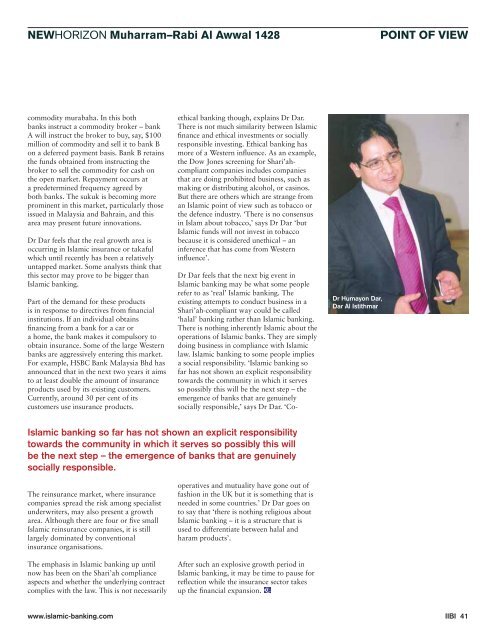issue no. 163 - january–march 2007 / muharram–rabi al awwal 1428
issue no. 163 - january–march 2007 / muharram–rabi al awwal 1428
issue no. 163 - january–march 2007 / muharram–rabi al awwal 1428
- No tags were found...
Create successful ePaper yourself
Turn your PDF publications into a flip-book with our unique Google optimized e-Paper software.
NEWHORIZON Muharram–Rabi Al Aww<strong>al</strong> <strong>1428</strong><br />
POINT OF VIEW<br />
commodity murabaha. In this both<br />
banks instruct a commodity broker – bank<br />
A will instruct the broker to buy, say, $100<br />
million of commodity and sell it to bank B<br />
on a deferred payment basis. Bank B retains<br />
the funds obtained from instructing the<br />
broker to sell the commodity for cash on<br />
the open market. Repayment occurs at<br />
a predetermined frequency agreed by<br />
both banks. The sukuk is becoming more<br />
prominent in this market, particularly those<br />
<strong>issue</strong>d in M<strong>al</strong>aysia and Bahrain, and this<br />
area may present future in<strong>no</strong>vations.<br />
Dr Dar feels that the re<strong>al</strong> growth area is<br />
occurring in Islamic insurance or takaful<br />
which until recently has been a relatively<br />
untapped market. Some an<strong>al</strong>ysts think that<br />
this sector may prove to be bigger than<br />
Islamic banking.<br />
Part of the demand for these products<br />
is in response to directives from financi<strong>al</strong><br />
institutions. If an individu<strong>al</strong> obtains<br />
financing from a bank for a car or<br />
a home, the bank makes it compulsory to<br />
obtain insurance. Some of the large Western<br />
banks are aggressively entering this market.<br />
For example, HSBC Bank M<strong>al</strong>aysia Bhd has<br />
an<strong>no</strong>unced that in the next two years it aims<br />
to at least double the amount of insurance<br />
products used by its existing customers.<br />
Currently, around 30 per cent of its<br />
customers use insurance products.<br />
ethic<strong>al</strong> banking though, explains Dr Dar.<br />
There is <strong>no</strong>t much similarity between Islamic<br />
finance and ethic<strong>al</strong> investments or soci<strong>al</strong>ly<br />
responsible investing. Ethic<strong>al</strong> banking has<br />
more of a Western influence. As an example,<br />
the Dow Jones screening for Shari’ahcompliant<br />
companies includes companies<br />
that are doing prohibited business, such as<br />
making or distributing <strong>al</strong>cohol, or casi<strong>no</strong>s.<br />
But there are others which are strange from<br />
an Islamic point of view such as tobacco or<br />
the defence industry. ‘There is <strong>no</strong> consensus<br />
in Islam about tobacco,’ says Dr Dar ‘but<br />
Islamic funds will <strong>no</strong>t invest in tobacco<br />
because it is considered unethic<strong>al</strong> – an<br />
inference that has come from Western<br />
influence’.<br />
Dr Humayon Dar,<br />
Dar Al Istithmar<br />
Islamic banking so far has <strong>no</strong>t shown an explicit responsibility<br />
towards the community in which it serves so possibly this will<br />
be the next step – the emergence of banks that are genuinely<br />
soci<strong>al</strong>ly responsible.<br />
The reinsurance market, where insurance<br />
companies spread the risk among speci<strong>al</strong>ist<br />
underwriters, may <strong>al</strong>so present a growth<br />
area. Although there are four or five sm<strong>al</strong>l<br />
Islamic reinsurance companies, it is still<br />
largely dominated by convention<strong>al</strong><br />
insurance organisations.<br />
The emphasis in Islamic banking up until<br />
<strong>no</strong>w has been on the Shari’ah compliance<br />
aspects and whether the underlying contract<br />
complies with the law. This is <strong>no</strong>t necessarily<br />
Dr Dar feels that the next big event in<br />
Islamic banking may be what some people<br />
refer to as ‘re<strong>al</strong>’ Islamic banking. The<br />
existing attempts to conduct business in a<br />
Shari’ah-compliant way could be c<strong>al</strong>led<br />
‘h<strong>al</strong><strong>al</strong>’ banking rather than Islamic banking.<br />
There is <strong>no</strong>thing inherently Islamic about the<br />
operations of Islamic banks. They are simply<br />
doing business in compliance with Islamic<br />
law. Islamic banking to some people implies<br />
a soci<strong>al</strong> responsibility. ‘Islamic banking so<br />
far has <strong>no</strong>t shown an explicit responsibility<br />
towards the community in which it serves<br />
so possibly this will be the next step – the<br />
emergence of banks that are genuinely<br />
soci<strong>al</strong>ly responsible,’ says Dr Dar. ‘Cooperatives<br />
and mutu<strong>al</strong>ity have gone out of<br />
fashion in the UK but it is something that is<br />
needed in some countries.’ Dr Dar goes on<br />
to say that ‘there is <strong>no</strong>thing religious about<br />
Islamic banking – it is a structure that is<br />
used to differentiate between h<strong>al</strong><strong>al</strong> and<br />
haram products’.<br />
After such an explosive growth period in<br />
Islamic banking, it may be time to pause for<br />
reflection while the insurance sector takes<br />
up the financi<strong>al</strong> expansion.<br />
www.islamic-banking.com IIBI 41
















